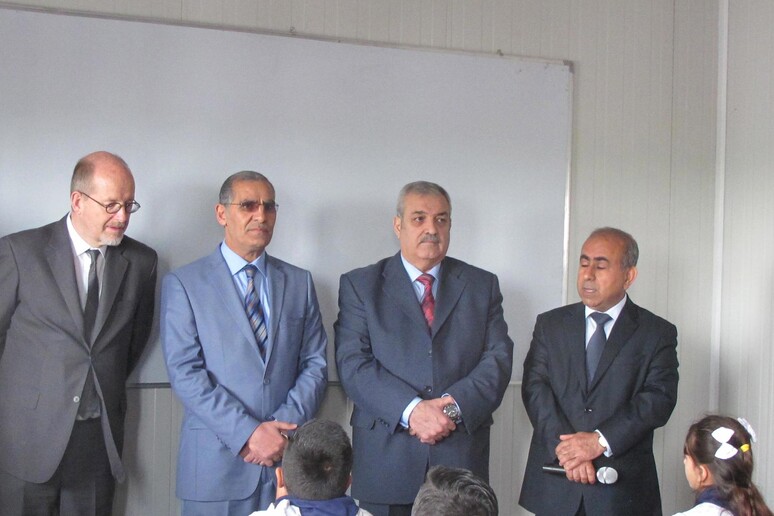As Kurdish Peshmerga continue to
push forward against Islamic State (ISIS) forces amid
speculation surrounding a future offensive to retake Mosul,
many of the internally displaced from the city are staying in
tents in the Baharka camp, where a secondary school was
inaugurated on Tuesday.
The camp, near the regional capital Erbil, was set up after
the June 2014 taking of Mosul by the transnational jihadist
group. The building of the school was made possible by a
200-million-dollar contribution to the UN for humanitarian
assistance announced shortly thereafter by Saudi Arabia.
The director of the United Nations Educational, Scientific
and Cultural Organization (UNESCO) office for Iraq, Axel Plathe,
flew in from Baghdad to speak at the event and discussed the
agency's work with ANSA.
As it is tasked with ensuring the conservation of world
heritage, the UNESCO has come in for criticism after the recent
destruction of the Mosul Museum, the World Heritage sites Hatra
and Nimrud and countless other artifacts and archaeological
sites in territory under ISIS control.
Plathe, however, is quick to point out that the agency has
neither an army nor a mandate "to place guards outside museums"
or anything similar.
What it can do, he told ANSA, is what it is currently doing
with the Iraqi National Museum in Baghdad, which recently
reopened after a 12-year closure.
UNESCO is "training staff on emergency preparedness and
helping the national museum complete inventories", he said,
which are "essential for preventing illicit trafficking and
tracking it".
He noted, however, that most of what had once been in the
Mosul museum had already been moved in Baghdad after 2003, but
that there were an estimated "170-180 items still present" at
the time of the attack. The Iraqi tourism and antiquities
ministry has not yet released an official assessment, he said.
It is still unclear what the extent of the damage to the
Hatra site was, he said, "which initial reports indicate was
entirely bulldozed", but which "satellite images indicate that
this may not be the case".
Plathe noted that "we are very much dependent on media
reports, and - as you know - the media reports are very
inaccurate and may be based on propaganda".
UNESCO's mandate includes promotion of freedom of
expression and the protection of journalists, and Iraq continues
to suffer one of the highest death tolls for journalists, many
of them killed in targeted assassinations.
Plathe said that Iraq is one of the five roll-out countries
for the UN Action Plan on the Safety of Journalists and the
Issue of Impunity. He noted that one of the problems was
security, but that others included the self-censorship linked to
it and the issue of "unclear ownership of the media and
non-existent independent media outlets", which are "essential
for democratic structures, accountability and a human rights
approach in government affairs".
"Many of the media outlets are linked to political parties,
which makes independent reporting difficult", and thus
journalists cannot "complete their professional duties".
UNESCO would like to address the lack of security for
journalists in Iraq through training, he said.
"We are hopefully soon - we are still negotiating the
funding - implementing a training for security forces on how to
deal with media", he said, "using a tested approach that was
successfully implementing in Tunisia".
"We bring together journalists and security forces in a
training environment where we train the security forces how to
deal with journalists."
He noted, moreover", that sometimes journalists "put
themselves at risk through non-professional and partisan
reporting", often linked to issue of unclear ownership of media.
He told ANSA that UNESCO had "recently signed an agreement
with the Iraqi journalists syndicate to train journalists on
non-partisan reporting, to give them some tools to protect
themselves through avoiding non-professional approaches".
Plathe stressed that, in any case, "the situation for
journalists in Iraq is very bad", making it extremely difficult
to get accurate information.
ALL RIGHTS RESERVED © Copyright ANSA











